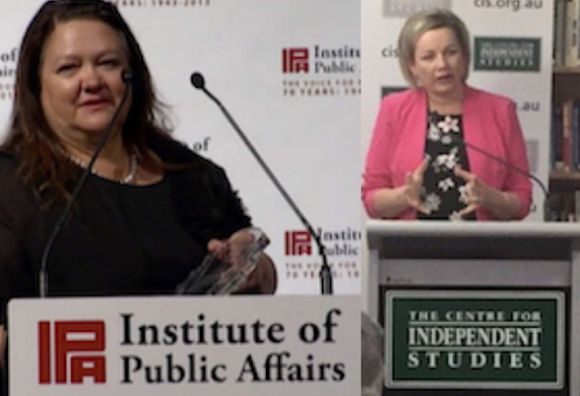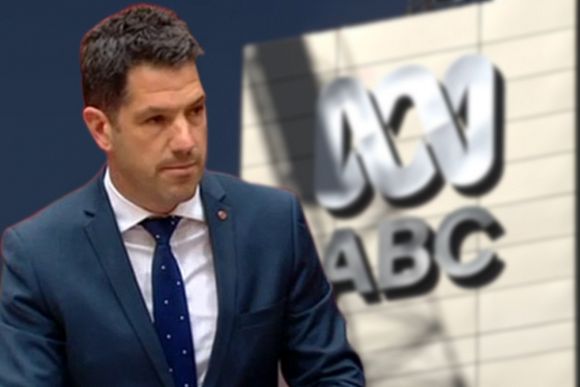Taxpayers might well question millions funded to the Menzies Research Centre by the Australian Government, given the think-tank's overarching Right-wing ties, writes David Paull.
IN A COUNTRY seemingly teeming with Right-wing think tanks and populist organisations, there aren't many that are so favoured by the Australian Government. While most people are familiar with the high-profile Institute of Public Affairs (IPA), the Menzies Research Centre (MRC) largely conducts itself under the radar despite having plenty of tax-payer funds to throw around.
Robert Menzies, the modern-day icon of the far-Right, has had his name given to a number of Right-wing groups: the Australian Taxpayer Association’s Menzies House and the newly emerged Robert Menzies Institute, based in Melbourne University. Sir Robert may give pause as to how his name is remembered today if he was alive. But this kind of appropriation is standard procedure for the modern-day far-Right, apparently eager to cloak themselves in some kind of legitimacy.
But what is it exactly that the MRC is researching and how is it funded?
First of all, it should be recognised that the MRC is a Liberal Party-conceived and backed think-tank. It was first established in 1994, apparently by Liberal Party apparatchiks such as Brian Loughnane who is still a director.
Its website claims the MRC
'... is a think-tank that champions Liberal principles and advocates for a free, just and prosperous Australia'.
From its inception, the MRC has maintained strong political connections with the Liberal Party, with former directors such as Georgina Downer – well-known oligarch in the Liberal Party/IPA world – ex-Liberal Party MP Trish Worth, former Senator Nick Minchin and current director Andrew Robb.
But it always has had strong connections with corporate personalities such as gas mogul and current MRC director Paul Espie; ex-Minerals Council boss Mitchell Hooke; director of the Australian Chamber of Commerce and Industry Tamsin Lawrence, and chair of the South Australian Productivity Commission Adrian Tembel. Murdoch journalist Nick Cater is currently the MRC's executive director.
In terms of funding, the MRC gives large amounts of cash to the Liberal Party in donations but receives considerably more back from the Australian Government. From limited information, it appears the centre was primarily set up to act as a front organisation on behalf of Parakeelia Pty Ltd, a major fund-raiser for the Liberal Party. Australian Electoral Commission (AEC) records show that "associated entity" returns lodged by the MRC are done on behalf of the Liberal Party and Parakeelia.
In this role, the MRC has donated over $1 million dollars to the Liberal Party over the last 20 years. But, from the Australian Government – incredibly while both the Liberal/National Party and the Labor Party (ALP) has held power – the MRC has received in total some $2.636 million over the last ten years from the Department of Finance. This money transfer is all done under the AEC classification of "other receipts", a catch-all category generally believed to cover blatant rorting.
Two points here: it seems the ALP has assisted the rise of this body but has certainly not been a beneficiary. It also seems the MRC has achieved a high level of institutional acceptance within the government apparatus itself — as a legitimate institution and one worthy of considerable taxpayer funds.
Paul Espie AO has been a significant donor over the years, donating some $200,000 over a ten-year period. A very good investment it seems, as the chairman/non-executive director of Empire Energy, he has recently received some $21 million dollars from the Government to assist him in kick-starting his gas activities in the Northern Territory. Another significant donor more recently has been the multi-national Uber, no doubt happy with the lax labour laws in Australia for the casual workforce.
The MRC also receives considerable amounts of money from another Liberal Party-linked associated entity, the Cormack Foundation — another major Liberal Party fund-raiser. AEC records show that this foundation has donated over $700,000 to the MRC over the last 20 years.
So, what does the MRC do with all this taxpayer and corporate money?
First of all, it plays an advocacy role. In recent times, it has been a strong advocate against "harsh lockdowns" and getting people to work in spite of a dangerous virus, which it seems is just a straight-jacket when it comes to business. Sentiments Australian entrepreneur Gerry Harvey would no doubt appreciate.
The MRC was and may still be a key sponsor of Australia's annual Conservative Political Action Conference (CPAC) — it was a "gold sponsor" at the 2019 event. The Australian version of the influential Right-wing event in the U.S. was backed in no small part by Koch-backed (big oil) organisations. In Australia, CPAC provides dedicated lip service to many Right-wing advocates across the world at its yearly event, as well as notable Australian politicians. A direct link to the sponsors of this event in Australia no longer exists, however.
And of course, we have the newly announced Robert Menzies Institute, heralded loudly on the MRC website as its latest investment. Heading this group is media personality Peta Credlin, wife of Brian Loughnane. The public advocation by this group gives no doubt as to their political motivation, as revealed by The Age recently.
Like the IPA and its focus on producing a cadre of young, Right-wing advocates on university campuses, the far-Right has placed great importance on gaining legitimacy and influence through the university system — an approach best emulated by the Koch Bros in the U.S.
So, do Australian taxpayers consider this money well-spent?
Given the evidence, it seems fair to characterise the MRC as a far-Right organisation, promoting ideas of small government and social and economic cues reminiscent of the broader worldwide neoliberal movement. Is this investment beneficial to our society, or really is this just a reflection of how much our society and politics has drifted from the centre where it used to reside?
This is still a near-democratic country. Therefore, it is your right to let your elected political representative know your feelings on how your money is spent.
David Paull is an Australian ecologist and blogger on politics and the environment. You can follow David on Twitter @davesgas.
 This work is licensed under a Creative Commons Attribution-NonCommercial-NoDerivs 3.0 Australia License
This work is licensed under a Creative Commons Attribution-NonCommercial-NoDerivs 3.0 Australia License
Support independent journalism Subscribe to IA.














